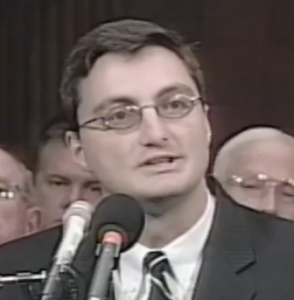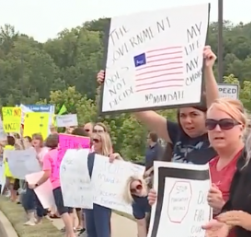U.S. District Judge David Bunning has ruled in favor of St. Elizabeth Healthcare in a suit filed by 47 employees asking for an injunction barring enforcement of the company’s COVID-19 vaccine mandate.
Bunning said in the ruling that, “If an employee believes his or her individual liberties are more important than legally permissible conditions on his or her employment, that employee can and should choose to exercise another individual liberty, no less significant – the right to seek other employment.”

Judge David Bunning (from video at his confirmation hearing)
Employees now have until Oct. 1 to get vaccinated or provide a medical or religious exemption, according to the ruling.
Bunning heard arguments from attorneys for both sides on Wednesday in the suit by Christy Beckerich, et.al against St. Elizabeth Medical Center, et al. Alan Statman argued for Beckerich, et al., and Mark Guilfoyle argued for St. Elizabeth.
The workers argued that the hospital can not force them to get vaccinated by threatening their jobs. They argued that the vaccination policy infringes upon their constitutional rights.
Lawyers for St. Elizabeth said they have approved dozens of medical and religious exemptions for the vaccine and offered a grace period for those who filed for an exemption, allowing their first dose by Oct. 1 and the second by Nov. 1.
Nearly all of the Tri-State’s major health systems are requiring vaccination by Oct. 1.
Bunning stated plaintiffs in the case “have not established a strong likelihood of success on the merits with respect to their claims under the ADA and Title VII… and have not raised sufficiently significant questions where they seek to do so.”
The ruling cited that St. Elizabeth. received 232 requests for medical exemptions for the vaccine mandate and have fully granted 31 requests, granted 143 deferment requests, denied 34 requests and have 24 requests pending.
“Plaintiffs have granted more medical accommodations than there are Plaintiffs in this case,” Bunning wrote.
Furthermore, of 739 religious exemptions requested, St. Elizabeth has granted 425; 39 were denied and 275 are pending.

Protests over vaccine mandate earlier this summer at St. Elizabeth
“Perhaps the best way to categorize the Plaintiffs’ position on the greater good is not that it is unimportant, but rather, that their individual liberties are more important,” Bunning writes.
“… The Defendants made their own choice about how to end the pandemic — they chose to require their employees to get vaccinated, to ‘assist our community in becoming the healthiest in America’ and to safeguard the health and well-being of associates, (their) patients, visitors and others who spend time in (their) facilities.”
… “the law states that vaccination mandates, both public and private, are permissible with appropriate exceptions… Actual liberty for all of us cannot exist when individual liberties override potential injury done to others…”
Bunning wrote: “The Court recognizes that the COVID-19 pandemic has become unfortunately political and vitriolic, on all sides. But the Court expressly refuses to adjudicate the political assertions in this case. Irrespective of politics, the Court has evaluated and analyzed the law and the legal arguments raised by both sides. Unfortunate for Plaintiffs, they have not stated a viable legal theory in support of injunctive relief, as each of the factors required to be considered, individually and collectively, weigh against the denial of injunctive relief.”
Read Judge Bunning’s ruling here.

















If an employee believes his or her character liberties are greater crucial than legally permissible conditions on his or her employment, that worker can and ought to pick to exercising another individual liberty, no much less massive – the proper to are trying to find different employment.
thank you.